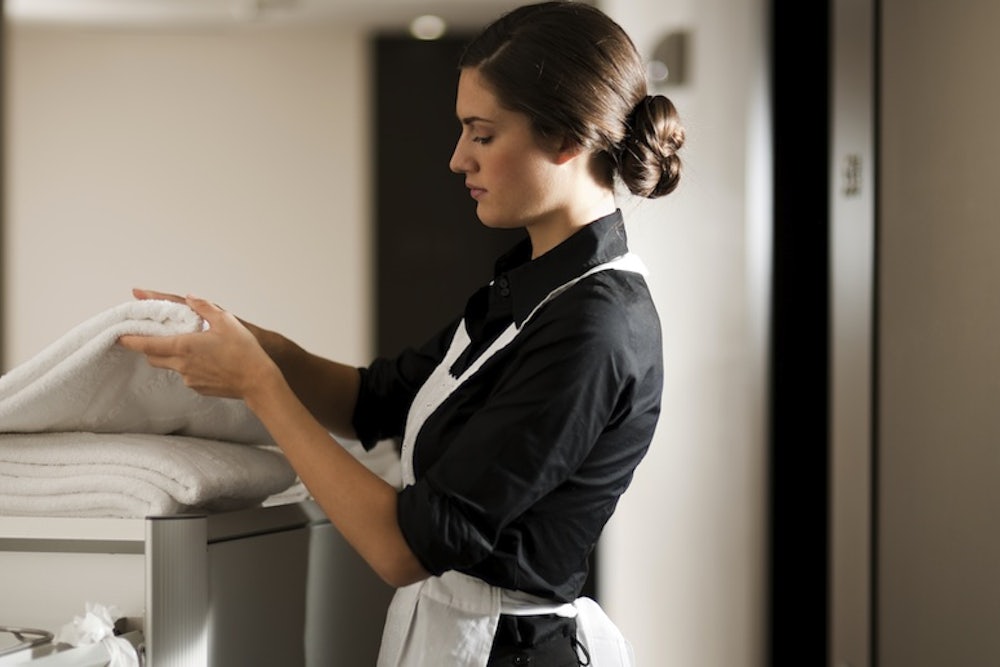When Dominique Strauss-Kahn was accused of assaulting Nafissatou Diallo, the maid who was sent to clean his hotel room, hospitality workers thought the story seemed all-too-plausible. In a New York Times op-ed, Jacob Tomsky, a veteran of the hotel industry, wrote that housekeepers are assaulted by guests “more often than you’d think,” and that their employers don’t offer much protection. In a recent account on xoJane, an anonymous woman describes a decade’s worth of sexual harassment in different parts of the hotel industry—from working the front desk to cleaning rooms. It’s so systemic, she says, that the women developed coordinated strategies to cope with it—like enlisting other housekeepers to stay with them when they’re assigned to clean the room of a “known pervert.”
These anecdotes are alarming—and now, new empirical research paints a truly dire picture of the lives of female hotel workers. For a new paper in the journal Gender, Work & Organization, a team of researchers from the Department of Tourism, Sport and Hotel Management at Griffith University in Australia, interviewed female hotel workers employed by 5-star hotels on the Gold Coast, a city in Queensland. Of the 46 women who participated in the study, 44 had experienced some kind of inappropriate advance from a male guest—ranging from jokes to propositions to assaults. Sanrda Kensbock, the study’s lead author, wasn’t able to give me a breakdown by type of incident, but it’s safe to say that—whatever form it takes—harassment a widespread problem. “We found guest-initiated sexual harassment to be pervasive and normalized within the hotel workplace,” she wrote. “The low status of hospitality workers renders them particularly vulnerable, with the power held by the instigator being a critical component of sexual harassment.”
Women described men who insisted they close the door while cleaning, grabbed their hands as they handed over change and asked where they could “find a girl.” Kensbock and her colleagues identified a few factors that put women in the hotel industry at a heightened risk for sexual harassment, including the “gendered” nature of their work as housekeepers and their lack of power relative to the guests. Many of the attendants also complained that they felt their uniforms were sexualizing, and that they did not suit their age. (Most of them were in their forties or older.) “You feel like an old-fashioned parlor maid in these uniforms,” one woman said. Others pointed out that dresses are not the most practical attire for the physically demanding work they do.
It doesn’t help that their work takes place in bedrooms—spaces that, for the guests, are “intimate, personal and potentially eroticized,” Kensbock says. “'Woman …bedroom’: [some guests] don’t think beyond that,” said Bianca, a hotel attendant in her forties. “I think it’s a male thing,” said Jane, a hotel worker in her sixties. “They see [a] bed, and what do you do in bed?”
The isolated nature of their work can be problematic, too. As Tomsky wrote in the Times, “They’re often alone on a floor, cleaning a vacant room, back to the door, the vacuum’s drone silencing all sound. A perfect setup for a horror movie.”
Most of the women in Kensbock’s study coped with harassment using passive strategies, like humor or deflection. Though the hotel management had protocols they could follow to report inappropriate behavior, women—fearing guests would retaliate by leaving negative surveys—rarely complained.
Service workers across the board may be at greater risk for sexual harassment: In a new survey of 688 restaurant workers, for instance, 78 percent of women and 55 percent of men reported sexual harassment by customers; 30 percent of the women said inappropriate touching was a “common occurrence.”
